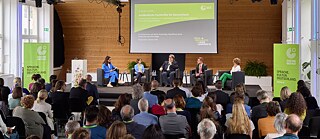Language Policy
German Language Teachers Are Key

Worldwide an additional four thousand German teachers are needed. Language skills are the key to successful integration for immigrant students and skilled workers alike – hence the need for well-trained German teachers in their native countries. This was the subject of a two-day symposium in Berlin under the banner “No skilled workers in Germany without German teachers”.
By Elske Brault

Training experts from the Goethe-Institut will provide information about the programme (Axel Grimpe, Goethe-Institut Jakarta, Steffen Kaupp, Goethe-Institut Hanoi, Jörg Klinner, Goethe-Institut Sao Paolo, Katina Klänhard, Head Office). | © Goethe-Institut / Bernhard Ludewig
Everyone agrees: Learning the language is a must
High quality German instruction is a must for successful integration in Germany. Thomas Liebig, a senior economist at the OECD, has researched the subject in depth. He asked immigrants and would-be immigrants around the world how important they think learning German is for successful immigration. Before going to Germany, only a small number of respondents were under the illusion that they could get by with English language skills alone. And there’s no doubt about that for those who’ve already made it to Germany: mastering the language is essential for a successful new life in Germany. Hence the importance of good German courses in their native countries that emphasize learning to communicate in German. “A great many candidates abroad are prepared to learn German before entering the country, but the opportunities are limited,” Liebig sums up the situation. In countries like Mexico, Kenya and India, the supply of teacher training is simply not keeping pace with demand.At the symposium, Surana Vibah, a German studies professor at the University of Mumbai, laughed as she recalled being woken up the day before by a call from the education minister of a large Indian province: “He asked if we could teach ten thousand skilled workers German. It was about a Memorandum of Understanding with Baden-Württemberg.” Vibah called on the representative of the German Academic Exchange Service (DAAD), who was also on the panel at the Berlin symposium, to provide grants or other forms of financial support for German teachers. For this is another obstacle to overcome: teachers abroad often receive lower pay and less esteem than their counterparts in Germany. Given the global shortage of German teachers, the Goethe-Institut is developing special programmes and international educational cooperation to remedy the situation so vocational schools in Vietnam, for example, can teach German to their students too.

Prof Surana Vibah from the University of Mumbai talks about the potential of German as a foreign language in India. | © Goethe-Institut / Bernhard Ludewig
Small groups and better teacher training
Many countries have yet to modernize their basic teaching approach: the traditional method there is still to have sixty pupils repeat, in unison, words and phrases spoon-fed to them by the teacher standing at the front of the class. And they still ask straightforward grammar questions, such as recognizing the verb in a sentence, on tests. A better way is to have learners practise their German in small group discussions about their feelings and everyday problems. Teacher training should be improved by breaking with old habits and teaching not just German language skills, but also modern didactic methods. Jan Sprenger, the head of teacher training at the Goethe-Institut, summed up the crucial demands on needs-driven teacher training abroad:- To offer German teachers good job and career opportunities
- To provide grants for teachers to spend time in Germany gaining practical language skills and knowledge about Germany for use in teaching in their home country
- To ensure that their qualifications are also recognized in foreign education systems.

Amira El-Ahl (moderator), Christoph Mohr (Head of Networking Programme) and Jan Sprenger (Head of Training) giving an overview of the main topics of the event. | © Goethe-Institut / Bernhard Ludewig
Further suggestions were made in the workshops at the symposium, such as to bring technical knowledge and language skills together, thereby adapting German teaching to meet occupational needs: A nurse needs to know medical terms, an electrical engineer the names of parts and components. In Germany, learning groups that are divided up according to occupation, sector or speciality already exist; teachers in other parts of the world still need to be trained for such specialized language instruction.
Another four thousand German teachers will be needed in the years ahead to meet demand, says Goethe-Institut President Carola Lentz. The new Skilled Labour Immigration Act, every aspect of which has now been in force since June, facilitates immigration to Germany for skilled foreign workers. However, “German wasn’t a central consideration,” admits Boris Petschulat from the Federal Ministry for Economic Affairs and Climate Action: “language skills are not required for most visas.”
Well-targeted support need for good German instruction
So it was all the more important to make it clear to the ministerial consultants attending the symposium that targeted support and training programmes are needed to improve German teaching abroad. The Goethe-Institut has developed a wide range of online programmes to attract new German teachers around the globe as well as programmes to prepare immigrants for everyday life and work in Germany before their arrival. A website called “My Way to Germany” answers a great many questions about practical matters they’ll be up against in Germany, covering everything from tax registration and health insurance all the way to separating the trash.
How does language teaching have to change in order to better fulfil the complex requirements? | © Goethe-Institut / Bernhard Ludewig
